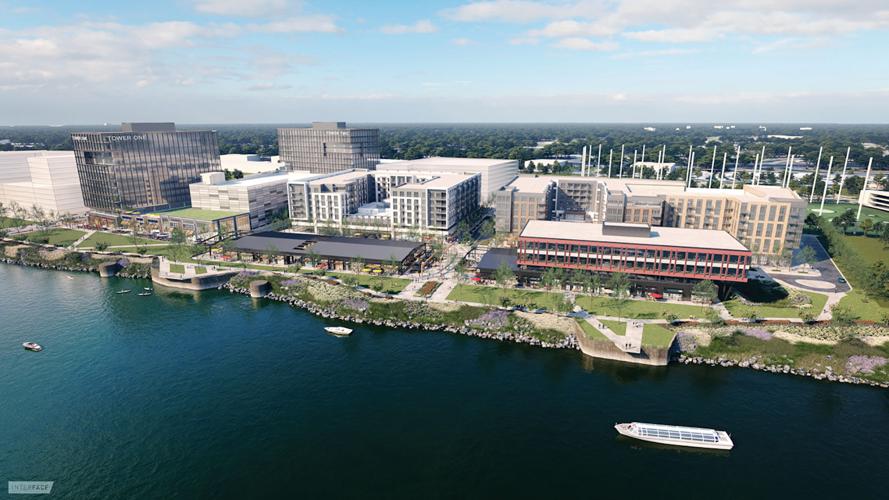Last summer, tech company Oracle paid $253 million for almost 70 acres on the East Bank of the Cumberland River in Nashville. So what exactly will the corporation be doing there?
Oracle stores, manages and manipulates large amounts of digital information. It also deals in software as a service (or SaaS, as it’s typically known), licensing digital infrastructure to clients who integrate Oracle into their business operations. Government clients, including the Department of Defense and intelligence agencies, also need Oracle, which promises them secure and efficient ways to keep track of all the data governments are interested in keeping track of.
If you ask people about Oracle’s business, another term you might hear is “enterprise software.” This is another way of referring to computer systems and applications used by a group of people — perhaps an entire corporation, agency or office, and perhaps simultaneously or remotely. Oracle sells and licenses these systems, crucial for big groups working together but prohibitively expensive for a single organization to build from scratch.
Oracle employs 48,000 people in the U.S. and 95,000 abroad, a workforce roughly the same size as Apple or Alphabet (Google’s parent company). The company utilizes a constellation of data centers, temperature-controlled Costco-size facilities full of the machines that respond to our computers’ requests for information. According to one former Oracle software engineer who preferred to remain anonymous, Oracle’s business success relies on its do-it-all services.
“They do everything enterprise: cloud computing, cloud storage, on-premise systems, software as a service,” he tells the Scene. “They are known for establishing deep dependencies on their software among Fortune 500 companies, then gouging for maintenance costs when their software doesn’t perform as well as advertised.” This engineer’s team was based out of Guadalajara, Mexico, which he says was a cost-cutting move by Oracle. He has since moved to Google.
Java, a widely used programming language, is one of Oracle’s crown jewels. The company acquired Java when it bought Sun Microsystems in 2010 and polices its intellectual property. Oracle sued Google for $8.8 billion for using Java in its Android operating system, launching an 11-year legal battle decided by the Supreme Court in April 2021. (Google won.)
A bona fide tech origin story helps give the company an air of authority to outsiders, like a mandate from the cloud. Young entrepreneurial founder Larry Ellison became obsessed with computers before they were cool (1966) and dropped out of an elite school (the University of Chicago) to strike out on his own in the Bay Area. He started the company that would become Oracle with two partners and $2,000, eventually growing it into the central data pillar of America’s 21st-century economy and accumulating, according to Bloomberg’s Billionaires Index, north of $85 billion (much of it equity).
Ellison owns a Hawaiian island and spends freely on things he likes: sailing, via his 288-foot megayacht Musashi and the internationally competitive yacht-racing syndicate Oracle Team USA, and tennis — he bought famed Southern California court complex Indian Wells in 2009. Close friend Steve Jobs photographed his fourth wedding, which was officiated by California’s U.S. Rep. Tom Lantos. Ellison is on the global short list of tech-company billionaires, alongside Zuckerberg, Musk, Gates and Bezos — although slightly lesser known to the average person, because to most people it’s not exactly clear what Oracle does.

Rendering of Oracle’s future Nashville campus
The company has tried to distance itself from being perceived as profiteers in a world dependent on big data. Last year, Oracle executive vice president Ken Glueck lashed out with an in-depth repudiation of a story by The Intercept’s Mara Hvistendahl, who had written about the company’s ties to Chinese surveillance and policing systems. (Glueck was suspended from Twitter for publicizing the reporter’s email and Signal phone number.) Currently, Oracle is under scrutiny for hosting TikTok data. The corporation did not answer the Scene’s requests for comment in time for publication.
Nashville lured the tech giant with a favorable deal on a new campus, hoping to reap the benefits of 8,500 jobs promised in the next decade. The state paid too — $65 million cash — though actual contracts haven’t been signed yet and aren’t available to the public, according to Tennessee’s Department of Economic and Community Development. Mayor John Cooper allowed Oracle to borrow $175 million from future property taxes to pay for related campus infrastructure, like a pedestrian bridge into Germantown and a reworked transportation grid. City leaders routinely promise tomorrow’s tax revenue for today’s expenses. As a candidate, Cooper railed against this type of fiscal management and pledged to use tax incentives to address affordable housing and food deserts. The deal was cast as a community benefits agreement by The Tennessean, though Oracle will reap the lion’s share of the benefits of the new infrastructure.
Oracle will bring thousands of commuters to the currently largely desolate East Bank, leaving the city to figure out an infrastructure response. The new campus has been a primary justification for dedicating billions more to East Bank redevelopment.
“Because of Oracle,” Cooper told a joint meeting of Metro’s Budget and Finance and Planning and Zoning committees on June 8, “you are given the opportunity. This council and this body recognizing this is the opportunity to go forward — that’s an exciting movement.”
Even before contracts have been signed, the mayor has leaned on Oracle to advance an overhaul of the East Bank.
“I worry about I-40 and I-24 being broken,” Cooper told the joint committee. “I worry about people from Donelson not being able to work at Oracle without having to go downtown. If the occasion of Oracle is giving us another tunnel under I-24 to connect it to neighborhoods, it seems like an opportunity.”







